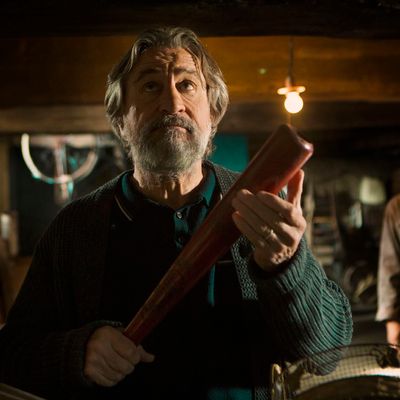
Since the late eighties, critics like me have blown raspberries at Robert De Niro for not taking his roles quite as seriously (to put it mildly) as he did in the pre–Raging Bull, Mega-Method-Immersion era, but every so often he finds his center again and reminds you that he’s still an amusing fellow — and a movie star. He and Michelle Pfeiffer make brief but harmonious music together in Luc Besson’s French-American co-production The Family, a black comedy that doesn’t begin to jell but has a sweetheart of a cast and the odd diverting moment.
De Niro plays Giovanni, now “Fred Blake,” a former Brooklyn Mafia bigwig in the Witness Protection Program who’s sentenced to live in France for the foreseeable future with his wife, Maggie (Pfeiffer), and his teenage son (John D’Leo) and daughter (Dianna Agron). The joke — an excellent one — is that they keep drawing attention to themselves by refusing to put up with disrespect, which is fairly constant given the trademark French condescension toward Americans. After each disaster (assault, vandalism, murder) a weary FBI man (Tommy Lee Jones) and his underlings have to ferry the misbehaving clan (you can take the family out of Brooklyn … ) to another part of the country. But the “Blakes” are not their own worst enemies. There’s a contract on Gio’s head and an especially remorseless hit man on their tail.
About that hit man: The tone problem is evident in the overture, a quick but graphic massacre of a man, his wife, son, and daughter, after which the killer saws off one of the dead man’s fingers. The music is sprightly rather than grim, and Besson isn’t one to stop and linger on the tragic dimension of what we’ve seen. Bodies are just fodder to him. The Family belongs to a genre of carnage comedy in which the violence is plentiful but neither wholly serious nor wholly facetious — an ugly twilight zone that only the rarest films manage to make sense of. (Two that do are based on Richard Condon books, The Manchurian Candidate and the Mafia picture Prizzi’s Honor — both held together by larger themes.) Even if you have no moral qualms or a hobgoblinish need for consistency, Besson’s seesaw seems off-kilter. The comedy diminishes the dramatic stakes. The brutality makes the comedy seem cheap.
Most of the actors, meanwhile, give realistic and intense performances. Not Tommy Lee — he does a paycheck turn, his standard dyspeptic shrug but with no subtext. It’s fun to see him with De Niro, though. They find a comic rhythm in their scenes. And Pfeiffer is all there. She’s a major film actress, one of the best in the English-speaking world, and it’s our loss as well as hers that she has never gotten the role that would put her in the pantheon with Jessica Lange, et al. Her Maggie could have been an outright caricature (the accent is from Married to the Mob), but she grounds every scene. Maggie is brittle and disappointed but relentlessly practical, holding her family together while her husband putters around. She grounds De Niro, too. You feel something intangible when they’re together: They’re in the moment and the moment is rich and full of emotion.
When Gio finds a manual typewriter in a pile of his new house’s junk, he begins to type a Goodfellas-like memoir — which makes his FBI handler (and his wife) nervous. There isn’t much in the way of a punch line to this thread: The hit-team arrives before the memoir can be circulated. But it leads to some witty moments, among them a scene in a local film society in which Gio gets to watch a movie that recalls his (and De Niro’s) glory days.
The kids are more than all right. Despite the language gap (which is minimized throughout), D’Leo’s Warren instantly susses out the ecosystem of his new school and reshapes it to his advantage. It’s only a pity that his mole is on the opposite cheek from De Niro’s. Agron (of Glee) is like a Britney who can act. She, Pfeiffer, and D’Leo hit authentic and moving notes during the final siege — enough to make you think that without Besson’s facetious tone, The Family might have been a hell of a thriller. But Besson — by no means a bad filmmaker — has gotten rich off that kind of violence that upsets no one, least of all jaded international action audiences. He tries to have it both ways and fails some of cinema’s most precious resources.


